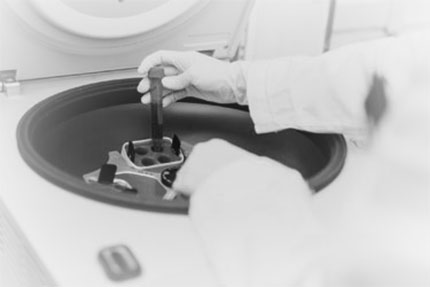In a clinical setting, more convenient and non-invasive methods for collection of patient samples are required.
In the past, differential profiling and functional studies have been performed mainly using tissues samples collected by invasive methods. However, in a clinical setting, more convenient and non-invasive methods are required, such as collection of peripheral blood or other bodily fluids:
Technical Advantages
Liquid biopsies remove the need for invasive, often painful surgeries and procedures for which there is risk of infection or other complications for the patient.
The convenience of liquid biopsies means samples can be taken repeatedly over the course of a patient’s treatment and changes can indicate how effective or ineffective a particular therapy is.
Liquid biopsies can detect disease progression or treatment resistance long before it would trigger clinical symptoms.
Limitation of adequate amounts of patient specimens is generally not a problem.

Exosomes are small membrane vesicles secreted by most cell types that play important roles in cell-to-cell communication. There is a rapidly growing interest in utilizing exosomes present in patient biofluids for molecular diagnostics in the clinic.
Recent studies suggest that exosomes secreted by tumor cells contain tumor specific proteins and miRNAs and therefore exosomes may contribute to intercellular communication within the tumor niche. In fact, in vitro delivery of exosomes purified from high grade cancer was found to significantly increase cell proliferation and promote cancer progression.
Additionally, exosomes are attractive as potential therapeutic delivery vehicles as they are natural shuttles of RNA and protein cargo.
LC Sciences is helping clinicians and researchers with:

It has been demonstrated that microRNAs are present in circulating blood plasma, protected from degradation by inclusion in lipid or lipoprotein complexes. Circulating microRNAs in plasma/serum represent a potential new approach for diagnostic screening. Indeed, characteristic changes in the serum or plasma miRNA profiles of several cancers or other conditions have identified unique signatures that could be exploited as novel biomarkers in the clinic.
Additionally, plasma/serum microRNA panels developed through extensive case-control genome-wide expression have considerable clinical value in determining patient prognosis. Expression levels of particular microRNAs could serve as a biomarker for worse survival of patients, and thus could serves as an important prognostic marker. Studies suggest that identifying and validating the expression of miRNAs in newly diagnosed patients could serve as potential biomarker for tumor aggressiveness, and such miRNAs could be useful for the screening of high-risk patients.
LC Sciences is helping clinicians and researchers with:

Investigating cellular pathophysiology through the study of intracellular biomarkers in various biofluids such as urine, breast milk and even cerebral spinal fluid has the potential of providing a deeper understanding of how individuals express unique patterns of various pathologies.
Ultimately, personalized therapeutic approaches to controlling these illnesses will result from these new diagnostic techniques. Recently this was demonstrated by a study highlighting a common clinical scenario. Multiple tissue biopsies were completed and failed to obtain critical clinical information, and finally a urine based liquid biopsies test confirmed the presence of a resistance mutation in non-small cell lung cancer[7].
LC Sciences is helping clinicians and researchers with:
On Demand Webinar Viewing
Presented by – Dr. Moemen Abdalla, Norgen Biotek and Dr. Christoph Eicken , LC Sciences
Webinar Outline
- Brief review of microRNA basics: history, biogenesis, function
- Recent developments of microRNA research in extracellular fluids and exosomes
- Current methods for sample preservation and extraction of various complex extracellular sample types including exosomes
- Current methods for microRNA discovery and profiling from extracellular sample types
- Case studies and application examples
Cancer Research Services
LC Sciences offers a range of services applicable to
clinical cancer research. Contact us to find out more.
References
- Cheng Y, Tan N, Yang J, Liu X, Cao X, He P, Dong X, Qin S, Zhang C. (2010) A translational study of circulating cell-free microRNA-1 in acute myocardial infarction. Clinical Science 119, 87-95. [article]
- Duelli DM, Hastings ML, Hearn SA, Iyengar R, Kim DJ, Yaddanapudi SC, Pigati L. (2010) Selective release of microRNA species from normal and malignant mammary epithelial cells. PloS ONE 5(10), e13515. [article]
- Alexandrov PN1, Dua P, Hill JM, Bhattacharjee S, Zhao Y, Lukiw WJ. (2014) microRNA (miRNA) speciation in Alzheimer’s disease (AD) cerebrospinal fluid (CSF) and extracellular fluid (ECF). Int J Biochem Mol Biol 3(4), 365-73. [article]
- Taha A Haj-Ahmad, Moemen AK Abdalla, Yousef Haj-Ahmad. (2014) Potential Urinary miRNA Biomarker Candidates for the Accurate Detection of Prostate Cancer among Benign Prostatic Hyperplasia Patients. J Cancer 5(3), 182–191. [article]
- Gildea JJ, Carlson JM, Schoeffel CD, Carey RM, Felder RA. (2013) Urinary Exosome miRNome Analysis and its Applications to Salt Sensitivity of Blood Pressure. Clin Biochem 46(12), 1131-4. [article]
- Zhou Q, Li M, Wang X, Li Q, Wang T, Zhu Q, Zhou X, Wang X, Gao X, Li X. (2012) Immune-related microRNAs are abundant in breast milk exosomes. Int J Biol Sc 8(1), 118-23. [article]
- Berz D, Raymond VM, Garst JH, Erlander MG. (2016) Non-invasive urine testing of EGFR activating mutation and T790M resistance mutation in non-small cell lung cancer. Exp Hematol Oncol 5:24. [article]
